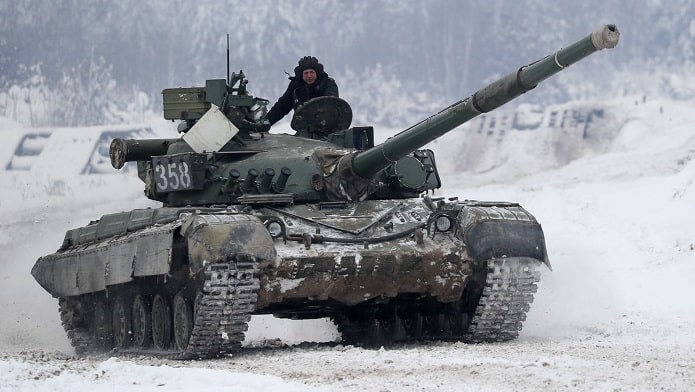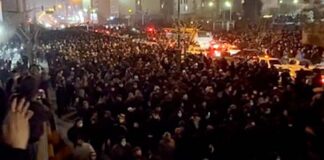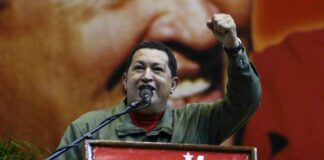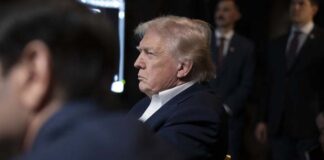Russia has amassed more than 130,000 troops on the Ukrainian border in an attempt to prevent the country from joining the NATO military alliance.
In response, the US and UK have begun shipping arms to Ukraine, while the US has stationed troops in neighbouring NATO states Poland and Romania.
British prime minister Boris Johnson said the West would make no compromises and “that includes the security of every NATO ally and the right of every European democracy to aspire to NATO membership”.
The military escalation is being fuelled by imperialism as the big capitalist powers fight for control over central and eastern Europe.
Imperialist tensions over former Soviet states date back to the end of the Cold War. The last Soviet President, Mikhail Gorbachev, allowed reunified Germany to join NATO on a promise from US secretary of state James Baker that “there would be no extension of NATO’s jurisdiction eastwards”.
But the US swiftly broke these promises, expanding NATO and the European Union to Russia’s borders.
Annex
At the 2014 Ukrainian election, the corrupt Russian-aligned Viktor Yanukovych administration was kicked out in favour of a right-wing, pro-Western government backed by the European Union and the US.
While Ukraine turned to NATO for support, Putin responded to the defeat of Yanukovych by sending Russian troops to annex Crimea, and supporting separatists fighting in the eastern Ukrainian area of Donbas.
While Ukraine has turned to the West, neighbouring state Belarus remains firmly behind Putin. Right-wing, authoritarian Belarusian president Alexander Lukashenko has been relying on the support of Putin since protests erupted across the country following his disputed 2020 election win.
And in recent months, tensions between Belarus and the EU have heightened as Poland mobilised the army to stop migrants and refugees crossing the Polish border. As the conflict escalates, Russia has reportedly begun conducting military drills in Belarus.
In the post-Soviet era, Russia was seen as a pushover, but Putin was able to rebuild Russia’s massive military power off the back of the country’s energy profits. Now access to Russian gas is exposing tensions between the NATO states as the West responds to Russia’s military mobilisation.
At least 40 per cent of Europe’s natural gas comes from Russia, with Europe’s largest economy and key NATO ally Germany buying most of it.
Russia has already constructed an additional Nord Stream 2 pipeline to deliver gas directly to Germany, which will double the capacity of the already operational Nord Stream 1 pipeline. But it can’t begin supply until it’s approved by German regulators.
The pipeline, which runs beneath the Baltic Sea, bypasses Ukraine, which has long been Russia’s entry into the European gas market. With gas transit fees contributing $2 billion to the Ukrainian GDP, approval of the pipeline would be a blow to the country’s economy.
But escalating conflict with Ukraine is threatening Nord Stream 2’s approval, with US President Biden vowing to put a stop to it if Russia invades Ukraine. The US is concerned that the pipeline will increase Russia’s influence in Europe, where gas prices are already soaring to record highs.
Pressure
German Chancellor Olaf Scholz has so far refused to bring the pipeline into the conflict, but under pressure, the country’s foreign minister AnnaLena Baerbock has said that the pipeline could be on the table as part of potential sanctions against Russia.
Any sanctions would need the approval of the 27 EU member states, including Austria and Bulgaria which are also highly dependent on Russian gas.
With the EU already canvassing other gas suppliers, the US has its own stake in the gas market. As the biggest LNG supplier to the EU, the US could profit massively if gas sanctions are imposed on Russia.
Along with talk of war on China, Australia is also talking up the prospects of armed conflict in Ukraine with Finance minister Simon Birmingham saying Australia “will not hesitate” to increase sanctions against Russia. As one of the global top LNG exporters, Australia also stands to gain economically from the conflict.
The NATO military alliance was built by the West to contain Russia. Despite its promises, since the end of the USSR, the West has been keen to press its advantage against Russia, and the Ukraine is a pawn as Russia and the West jockey for influence.
Socialists should oppose the war-mongering of our rulers. The economic competition between states that is inherent in global capitalism inevitably leads to military rivalry and competition.
We need to campaign against any move by the Morrison government to foment war.
To defeat imperialism and the threat of war, we need to fight the capitalist system that underpins it.
By Ruby Wawn






